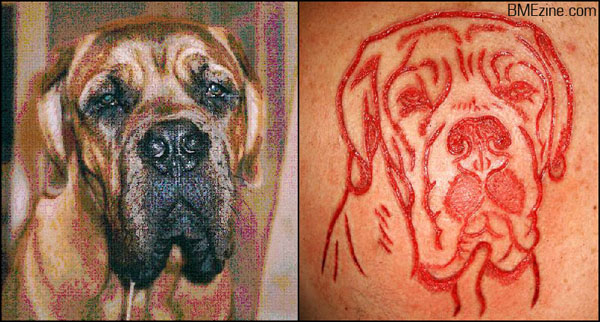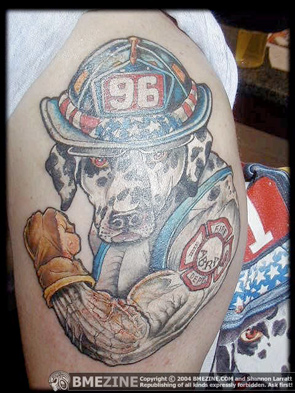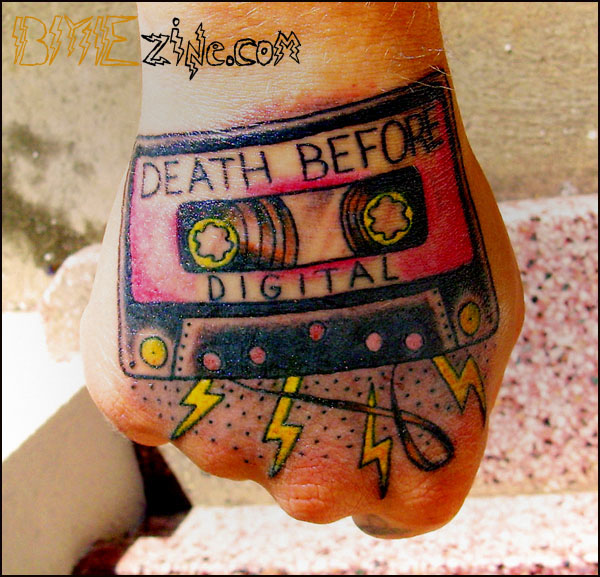This memorial (I’m assuming) portrait cutting is by Brian..

See more in “Misc. Cuttings“ (Scarification)
This memorial (I’m assuming) portrait cutting is by Brian..

See more in “Misc. Cuttings“ (Scarification)
Cast your mind back for 100,000,000 shakes* to this beautiful scarification piece on Eric (by Wayde) – The photo below is how it’s looking 50,400 minutes** later!
* = A second. ** = Five weeks.
See more in “Skin Removal Scarification“ (Scarification)
By anji, HPP INK, Eugene, Oregon.
See more in “Old School (and Old) Tattoos“ (Tattoos)

 While I think it’s silly for most employers to take a hard and fast oppositional approach to modified employees, I’m on record as saying that it’s their choice and that, in arenas such as the military where decorum and obedience are of the utmost importance, even arbitrary enforcement of anti-modification rules seems in line with their power structures. (Even if tattoos and tattoo culture seem indelibly linked to many branches of the military, but alas.)
While I think it’s silly for most employers to take a hard and fast oppositional approach to modified employees, I’m on record as saying that it’s their choice and that, in arenas such as the military where decorum and obedience are of the utmost importance, even arbitrary enforcement of anti-modification rules seems in line with their power structures. (Even if tattoos and tattoo culture seem indelibly linked to many branches of the military, but alas.)
With all that said, leave the damn firefighters alone. In June, L.A. Times columnist Sandy Banks wrote about the Los Angeles Fire Department’s new policy that firefighters must not have any visible tattoos, either while on call or while in the firehouse:
It’s a “grooming issue,” said Capt. Armando Hogan, spokesman for Chief Douglas Barry. “We need to make sure we’re professional-looking. We’ve got an image to uphold.”
Image?
This is a department that recently cost the city $16 million in payoffs to firefighters who’ve been insulted, harassed and discriminated against on the job. [Ed. Note: Emphasis mine.] And they’re worried that people will think they’re unprofessional because a guy has his kids’ names inked on his arm or flames crawling up his neck?
You know what? If you’re working in a customer service job, fine — a grooming standard should absolutely be adhered to. But firefighters? If you’re coming into contact with a firefighter, it’s probably because they’re saving your life, saving your house, or saving someone you know or love. If the barista’s forehead tattoo is a turn-off, understandable, but is anyone seriously going to file a complaint that the guy showing up at 4 a.m. to put out a fire had some visible kanji?
Well, it seems like things are getting worse in L.A. Dan Stark, a heavily tattooed eight-year veteran of the department, has been the butt of some idiotic harassment as of late. Banks gives an update:
The day the policy took effect in April, he said someone left a copy of the edict on his station’s kitchen table, next to a photo of a group of shrouded Muslim women, labeled with the names of five firefighters — including him — who are heavily tattooed.
Then he found his station locker covered with copies of the policy, he said. That meant someone had broken into it, or used the spare key kept in the captain’s dorm. Later that day, he said, someone drew a picture of a mummy and captioned it “Stark’s new uniform.”
When he complained about the ribbing, one captain told him to quit griping and be a team player, he said. Another suggested he get some tattoos removed, as a sort of goodwill gesture. Another official said he risked ruining his career if he kept complaining. None apparently forwarded his complaints up the chain of command.
So … that’s pretty great. To recap: Fire department is exposed for abuse, hazing, etc., and revamps its policies to ensure proper treatment of its firefighters. Another new policy is put into place to prohibit visible tattoos on firefighters in the same department. Tattooed firefighters start getting shit from non-tattooed ones. Nobody does anything.
As Banks points out, the real issue here isn’t tattoos, though that serves as a microcosm of the glaring hypocrisy of an organization that has apparently done nothing to combat its internal problems. But again, of all professions, as far as interaction with the public goes, firefighters rank pretty high on the virtuousness list. The ways in which corruption can manifest out are few, and they’re pretty much just there to save our asses and occasionally pose shirtless for hunky calendars. If any profession deserves to be cut some slack on this front, it’s probably them.
Los Angeles Fire Department tattoo coverup muddles real mission, Discomfort over L.A. Fire Department’s tattoo policy is more than skin deep [Los Angeles Times]
Firefighter Tattoos [Strike The Box]
 |
| Photo credit: Mirror.co.uk |
The conventional wisdom is well established at this point: Outside of certain cultural traditions, henna tattoos are something you get done as a vacation time-killer in between having your hair put into cornrows and getting hit on by swarthy European millionaires who want nothing more than an afternoon with someone else’s wife. Harmless, right? WRONG. Dead wrong. Henna’s bloodlust knows no bounds and, make no mistake, it’s coming for you. You and your children. This red-inked menace is even taking the shape of beloved American cartoon characters in its quest to disfigure and mutilate the youth of today:
A boy of three was scarred for life after suffering horrific burns from a dodgy holiday henna tattoo of Bart Simpson.
Vinnie England got the temporary image of his TV hero from a Spanish street stall.
But the trader may not have been using the safe, natural henna he claimed because Vinnie suffered an appalling reaction. His skin became inflamed, sore and blistered.
Now he has a three-inch bright red outline of Bart drying his backside on his forearm.
The ink has since faded from this young hero’s arm, but the scar may be permanent (probably not). Some suspect that the ink may have been mixed with a low-cost hair dye called PPD, which is known for instigating poor skin reactions and is commonly combined with henna, but who are you going to believe? Those fat-cats shilling for the multi-billion dollar henna industry? I think not.
Three-year-old scarred for life by henna tattoo of Bart Simpson done in Benidorm [Mirror.co.uk]
I’m not going to give the location of this tattoo away until you click through, but I will say I broke my arm in one once and didn’t realise until the next morning..
See more in “Lettering Tattoos“ (Tattoos)
So, both of the people who regularly read my posts here are probably aware of my proclivity to occasionally find a particularly silly article by some poor jamoke (who probably doesn’t give half a shit about body modification but just needs to file 800 words thrice weekly to his local newspaper so he doesn’t lose his health benefits) and then eviscerate them because ha ha they don’t understand body modification, jerks! I’m not apologizing for this, but I would like to clarify my position: I don’t actually care at all if somebody is perplexed or even grossed out by certain types of body modification. The pursuit of body modification is not an absolute, and it’s silly and arrogant to think that just because somebody doesn’t particularly enjoy tattoos or scarification or implants that there is something fundamentally wrong with them.
The issue I take with these sorts articles is not that the authors don’t appreciate body modification, but rather that they so often allow their lack of understanding to take the form of a hatred and mistrust of those for whom body modification is fundamentally important. Because of this, the level of discourse just tends to devolve into “… and 60 years from now, old people who are bitter because they tattooed their faces when they were still in the womb and never got a job will be furious because of their inky, flabby, unemployed skin and their inevitable uprising will give way to the extremist Muslim rapture!” and other such statements that are supposed to explain why body modification isn’t just an unattractive fad (or whatever), but is actually indicative of the hell-bound path on which our society has found itself, and it’s all because Scarlett Johansson got her septum pierced or the tollbooth guy had a tattoo on his neck.
With all that said, I’m admittedly confused by this column by Brian Goodings of The Blue Mountains Courier-Herald, which seems to take the opinion that … well, I can’t quite tell.
“When I was young I used to wear ill-fitting clothes (remember elephant pants?) and listen to strange music but when I got older, I just stopped doing so. The time for that kind of thing in my life had passed.”
“Strange music,” you say? Strange like John Zorn or strange like Crazy Town? I have to say that lines like, “I used to … listen to strange music but when I got older, I just stopped doing so” sound like pure propaganda and make it hard to believe the person who wrote them is under 50 years old. (Which is fine, of course, but the article’s tone seems to suggest the author is going for an, “I’m a Generation-Y’er who has seen the light!” sort of thing.) That said, I do remember elephant pants! We used to call them “phat pants” though, I think. Maybe we went to the same “raver drug warehouse parties”!
Goodings goes on to “wonder about the fate of our younger people because tattoos and many kinds of piercing leave a more permanent reminder of younger days that isn’t just going to go away when the wearer gets older.” It’s not that he dislikes tattoos — he even admits that he’s seen many he enjoys on people his age, whatever that is. (Presumably between 25-60.) But his concern is with some more extreme procedures he’s seen.
“Case in point: when I was in Denmark this summer with my family we visited the amusement park Tivoli. While there, we ran into a whole group of youngish men and women whom I believe would be called ‘Goths’. As a friend of my said, a couple of them looked like they’d fallen face-first into a fishing tackle box and come up worse for wear.”
Great joke. Nailed it.
“I’ve never seen such an array of piercing and black makeup and… well, you get the picture. But – and here’s the strangest thing- one of the young men was sporting a nifty pair of horns on his forehead. I’m not kidding; he had a pair of two-inch nubbins created by implants buried under his skin.
“His face was also heavily tattooed, as was every bare inch of skin that I could see. He and his buddy also had those earlobe discs-thingies and when they took them out to go on the rides, their stretched earlobes hung down the sides of their heads and moved like turkey wattles.”
Let’s revisit my initial point: I completely understand being put off by very heavily modified people when it’s something you are not used to. What Goodings is doing here is actually surprisingly subtly insidious: Later on in the piece, he admits to having done some research about body modification while writing this article. (Although he warns “this isn’t the kind of research I would recommend to anybody. The horn implants are tame compared to some of the stuff that people are doing to their bodies.” Ha ha body modification is gross!) Even a cursory look at BME or a similar site provides a handy enough resource for a writer to at least learn the correct terminology. But Goodings makes reference to “earlobe discs-thingies,” which sounds ridiculous to anyone who knows a plug or tunnel when they see one, but to those who are unfamiliar or just generally don’t care? It makes the people being described sound ridiculous and discredits them just because of their modifications. Goodings doesn’t seem like he’s really against this stuff for the most part (the fact that he trots out the hoary old “disfigurements/mutilations” descriptor notwithstanding), so consciously using this sort of language is a curious decision and makes a bewilderingly off-kilter article all the more unfocused.
And good lord is it ever bewildering — the real problem with this article is that it’s just poorly reasoned. After a piecemeal beginning, the bottom half of the piece jackknifes and flies off the overpass as Goodings starts throwing out half-baked ideas about what hardcore modifications really mean.
“I wonder if this kind of stuff is based on the deepest of narcissisms or perhaps they are trying to say, ‘I’m so alienated from human society that I don’t even want to look like a person…’
“[… M]aybe, just maybe, these are very sensitive people who feel, like many others in our time, utterly powerless to significantly change the world in any other way so instead they ‘alter’ their own bodies.
“[…] Maybe they are tuned into and even reflect the deep angst felt by creation itself as the extinction rates of our neighbours speed up and the unsustainable economies crash and often the whole world looks like it’s heading you-know-where in a handbasket.”
All of which seems to be saying, body modification to Goodings is a means of displaying one’s feelings of weakness and acquiescence to the demands of a cruel world, rather than being a method of expression, beautification or even just a fad. Those who engage in heavy body modification, Goodings seems to be suggesting, are trying to ugly themselves up so that they fit in with their crumbling surroundings. Either that or he’s trying to be zeitgeisty enough to write his way into a bigger paper. It’s a toss-up.
And then there’s the finale:
“Perhaps it’s always been thus with the upcoming generation but I sense there’s something deeper going on nowadays on many levels and I believe it does signify a global paradigm shift in almost everything we do. Desperation is running high – but so is hope.”
I’m not trying to be a dick, but this doesn’t even mean anything. Platitudes and poor attempts to insert buzzwords do not a coherent editorial make; this reads like a letter a high school sophomore would write to Obama while recovering from wisdom tooth surgery. And the shame is that it’s not like there aren’t parallels and associations to be drawn between body modification and certain other cultural and societal movements and trends, but the author misses those completely, and instead resorts to some Dadaist nonsense that seems to say that, as the western world becomes more fucked up, so too do those for whom body modification is an integral part of their lives regress into some sort of dystopic mess of Mad Max-esque cretins. But … maybe there’s more to it than that? So stay hopeful? With your ear-disc-thingies? Now that’s analysis you can take to the bank. After you get it from the dime-store.
On the Horns of a Dilemma [Blue Mountains Courier-Herald]
This cracking Anti-MP3 / Pro-Cassette tattoo on Danny‘s hand is by Rob Junod, Cold Steel America.

See more in “Hand Tattoos“ (Tattoos)